In This Issue
Register for Care4u Family Conference
Vivace Voices Choir is Back!
National Dementia-Friendly Communities Awards
Understanding Responsive Behaviours
Manitoba Researcher Investigates Treatments for Dementia
October is Lewy Body Dementia Awareness Month
Dementia Care – Register Today!
Join us for our Fall Family Education
Join our NEW Support Groups!
Minds in Motion – Register Today!
Register for Care4u Family Conference
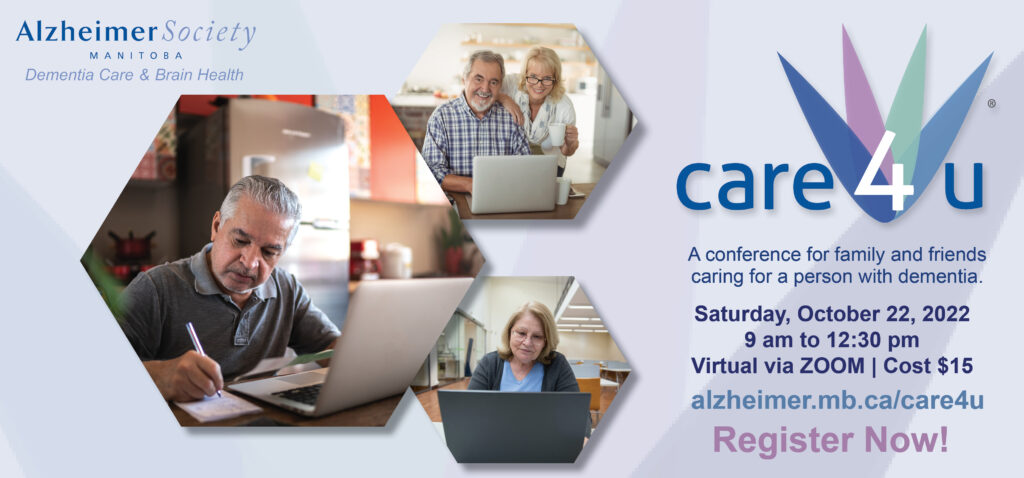
Register for the 2022 Care4u Family Conference!
Register now and join us on Saturday, October 22, 2022 from 9 am to 12:30 pm via ZOOM for an educational morning featuring healthcare professionals who are ready to share practical care techniques and community resources while empowering you as care partners to pay attention to your own well-being.
For more information on the sessions and speakers, click here. The conference will take place via Zoom.
Vivace Voices Choir is Back!
 Music has a deep connection to memory. “Listening to and performing music reactivates areas of the brain associated with memory, reasoning, speech, emotion and reward.” —Harvard Health,
Music has a deep connection to memory. “Listening to and performing music reactivates areas of the brain associated with memory, reasoning, speech, emotion and reward.” —Harvard Health,
That’s why, six years ago, a Canadian Mennonite University graduate decided to start Vivace Voices Choir for persons living with dementia and their care partners. They understood that some people living with dementia like to sing, but might not feel comfortable singing in a regular community choir, where it might be harder to keep up.
The Vivace Voices Choir leads singers and their care partners through popular music, both familiar songs and new ones. The choir is a music program for participants to enjoy the experience rather than rehearsals geared towards a public event. What happens at the end of each 10-week session is decided collectively by the group and could be anything from a singalong with the audience to an informal performance.
The biggest benefit of Vivace Voices Choir is getting people out into the community to connect with one another socially and through music. It’s also an opportunity for each care partner and the person living with dementia to do something together that they both enjoy.
Sessions take place at CMU, 600 Shaftesbury Blvd. in Winnipeg. For more information or to register, contact the Community School of Music & the Arts at CMU: [email protected] or 204-487-3300 x691. No prior choral experience is required, and there are no auditions.
Check out what this past participant had to say about Vivace Voices Choir:
“I haven’t been in a choir since I was a soprano—long ago. When the chance came to sing with an Alzheimer’s choir I jumped. The results have been good. We with Alzheimer’s, and our caregiver’s, voices blend beautifully—and we have lots of fun. The conductor and music therapy students set a warm, welcoming tone. Oh, the joy of singing!”
– Past choir participant
National Dementia-Friendly Communities Awards
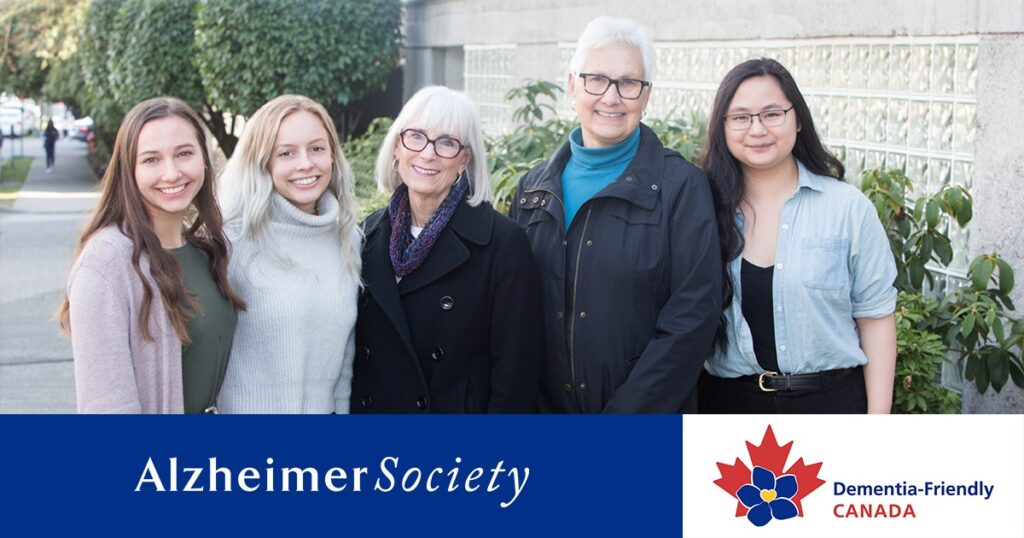
We are excited to announce the launch of the National Dementia-Friendly Communities Awards. These awards will recognize the amazing dementia-friendly work that is happening in communities across the country. Nominations are currently open.
If you know of an individual or group who is doing dementia-friendly work and is inspiring others to do the same, we’d love to hear from you. To learn more about the awards and how to submit your nomination, click here.
Understanding Responsive Behaviours

Responsive and reactive behaviours are terms commonly used when a person living with dementia responds — with actions, words or gestures — to something negative, frustrating or confusing in their social and physical environment.
The responses may be verbal like yelling, swearing or name calling or physical like pushing or striking out. It can also manifest as social withdrawal, appearing lonely or fearful. These changes in behaviour can be upsetting and frustrating for both the person with dementia and those around them.
This is often the person with dementia trying to communicate a need or concern. As a care partner, it is important to try to identify the unmet need to better support the person.
Below are some strategies that can help the situation:
- Approach slowly from the front at the same eye level.
- Validate their feelings: “That must be frustrating”, “I can see how you would feel that way”.
- Respond in a supportive manner and reassure in a gentle voice.
- Investigate their needs: Is it pain? Is it loneliness?
- Look for sources of discomfort and reduce stimulation: Is it too bright? Is it too noisy?
- Adapt the environment to make it more comfortable.
- Provide companionship and understanding.
- Give them time and space. Leave the room as needed (but ensure the person’s safety).
- Engage in simple activities. Break activities into manageable steps.
- Reminisce and engage with music.
- Provide redirection and substitution using activities that are meaningful to the person.
- Show them the bathroom, bedroom or familiar items if they are losing their way.
- Avoid arguing or expressing anger or irritation, verbally or non-verbally.
Remember, all behaviour has meaning. It’s best to take the time to understand what the person is trying to communicate. Care partners also need to look after your well-being and safety, seek help and support from family and friends. If you need to talk out some strategies for your situation, please call the Alzheimer Society for support. We are here to help.
For more information, check out our brochure on Dementia and Responsive Behaviours.
Manitoba Researcher Investigates Treatments for Dementia

At age 20, Francis Delicata was studying chemistry and biology at university when he noticed his grandfather—who lived with dementia—couldn’t keep up with conversations. At the time, he thought this was just part of the ageing process. Later he understood how debilitating dementia could be for those affected and their families.
This inspired Francis to learn about more effective treatment options for dementia. He became particularly fascinated with astrocytes, specialized glial cells that are involved in basic brain functioning such as nutrient supply, and in more complex functions such as network communications in the central nervous system. Astrocytes are also involved in the regulation of blood flow to the brain; inadequate blood supply can cause irreversible damage to brain cells.
Through his research, Francis aims to build on current understanding of Alzheimer’s disease and other forms of dementia. This is especially relevant as the incidence of dementia is increasing with longer life expectancies. Francis points out that, although there is ample ongoing research and a lot is known about astrocytes, little is known about how we can target them in the treatment of Alzheimer’s disease.
“When someone thinks of the brain, neurons are the first thing that come to mind. But many other cells are just as important and are implicated in states of dysfunction. This is why the focus of my research is on non-neuronal cells, specifically on astrocytes,” says Francis.
Since astrocytes have numerous critical roles in healthy brain function, they are implicated in a number of other conditions, including dementia and Alzheimer’s disease. In Alzheimer’s disease, astrocytes show altered behaviour; they are hyperactive.
“In our project, we’re looking at ways to reduce or prevent this hyperactivity by selectively targeting specific receptors (P2Y1 proteins) on astrocytes,” explains Francis.
Currently, there is no cure for Alzheimer’s disease. Current treatments provide short-term benefits but don’t prevent outcomes of progressive cell degeneration and cognitive decline. By targeting a specific receptor—the P2Y1 protein on astrocytes—and reducing or blocking its activity, Francis and the rest of the team at The Stobart Lab (www.stobartlab.com), hope to show that disease progression can be significantly reduced or even halted. They are looking at various interventional time points, including early as well as late stage dementia.
Francis Delicata is a recipient of the 2022 Alzheimer Society Research Program (ASRP) funding Canadian researchers in the field of Alzheimer’s disease and other dementias and investing in the future of dementia care in Canada. Since the Program’s start in 1989, we have invested over $70 million in grants and awards toward innovative research that brings us closer to a future without Alzheimer’s disease and other dementias.
October is Lewy Body Dementia Awareness Month
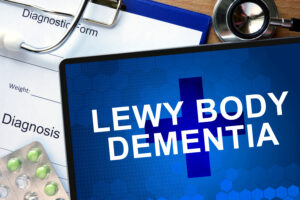
If you don’t know what Lewy body dementia (LBD) is all about, now is the time to find out: October is Lewy Body Dementia Awareness Month.
LBD, or “Dementia with Lewy bodies,” is a type of dementia that affects the thinking and moving parts of the brain. LBD occurs because of abnormal deposits of a protein called alpha-synuclein that develops inside the brain’s nerve cells. This disease accounts for 5 to 15% of all dementia cases.
LBD can occur by itself, or together with Alzheimer’s or Parkinson’s disease.
The Alzheimer Society provides resources for families living with all forms of dementias. If you or someone you know has Lewy body dementia, please contact our staff to learn more about the disease and about programs available to you. You can also learn more at the Alzheimer Society of Canada website.
Essentials of Day-to-day Dementia Care – Sponsored by All Seniors Care
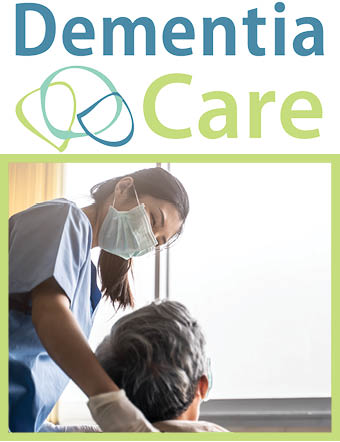
We invite you to our Dementia Care Professional Development Series! Sessions are geared towards health care staff and take place online monthly until March 2023.
Join our next session on Thursday, October 6 from 2 – 3 pm called Less is More: Deprescribing as a Way to Reduce Medication Risks and Improve Health featuring Allison Bell where she will discuss tools and guidelines that will help you reduce medications, assess outcomes, and support a person who has been through the process of deprescribing.
This professional development series, which started in April, is focusing on the foundation for successful and meaningful dementia care that will benefit the person with dementia, their families and the healthcare system as a whole. For a $20 registration fee, you can watch all remaining 6 live presentations and access to recordings of all 11 sessions!
Visit our website today for upcoming sessions, speaker bios and to register today!
Join us for our Fall Family Education

Come join our education sessions as we cover a wide range of topics – from the progression of dementia to legal and financial matters. The sessions are geared towards helping people with dementia and their caregivers be confident on their dementia journey. Here’s what’s coming up:
Financial Confidence Workshop, presented by IG Wealth Management (virtual and in-person)
Wednesday, November 2, 2 – 3 pm
Alzheimer Society of Manitoba Boardroom, 10-120 Donald Street, Winnipeg
Location/Parking Details
Click here to register for the in-person session.
Click here to register for the virtual session.
Living with Dementia: First Steps – Part 2 (virtual only)
Saturday, November 5, 10 – 11:45 am
Virtual via ZOOM
Click here to register.
Medications as We Age: How to Make the Most of Them and Prevent Harmful Effects (virtual only)
Wednesday, November 16, 2 – 3 pm
Virtual via ZOOM
Click here to register.
Check out all available in-person and virtual family education sessions on our website!
Join our NEW Support Groups!
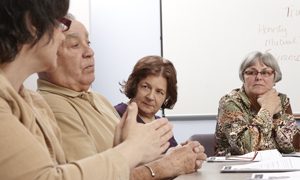
Fall is a great time to join one of our many virtual or in-person support group offerings.
Support groups provide participants with an opportunity to learn more about dementia and its progression, share feelings and common experiences, exchange practical coping strategies and mutual support, as well as participate in meaningful discussions.
“Creating new opportunities for caregivers to come together to exchange mutual support and understanding, while also reducing feelings of loneliness that caregivers may experience is incredibly important,” says Jessica Harper, Client Services Manager.
These support groups are a confidential and safe place for caregivers to share their experiences of caring for a person with dementia or memory loss. We welcome everyone to this inclusive environment for people of different ethnicities, cultures or persons who identify as part of the 2SLGBTQ+ community.
Care Partner Support Groups
In recent months we gathered feedback about potential new care partner support groups that might better suit the needs of caregivers as they navigate their dementia journey. We listened and now have three new care partner support groups! It’s important for participants to relate and feel comfortable talking with others in a similar situations.
NEW – Men’s Coffee Talk Support Group
Meets in-person at the provincial office in Winnipeg on the fourth Thursday of the month from 10:00 to 11:30 am.
This support group is for male-identifying care partners to connect with one another and share information about their experience of caring for a person with Alzheimer’s disease or another dementia.
NEW – Spouses of People Living with Dementia in Personal Care Home
Meets in-person at the provincial office in Winnipeg on the second Wednesday of the month from 2:00 to 3:30 pm.
This support group offers spouses of people with dementia living in a personal care home the opportunity to meet and share information about their experience of caring for someone who has transitioned into long-term care. This caregiving experience presents unique challenges for care partners as they:
- navigate their role changes,
- adjust to changes in self-identify
- adjust to living separately from their spouse
- help to support a spouse in their dementia journey
Virtual Support Group for Care Partners of People with Younger Onset Support Group
The support group offers care partners the opportunity to meet and share information about their experience(s) of caring for a person with younger onset dementia, when symptoms present and/or diagnosis occurs prior to the age of 65 over ZOOM.
- NEW – First Monday of the month from 7:00 to 8:30 pm
- Third Monday of the month from 7:00 to 8:30 pm
Virtual Support Group for Adult Children
Meets on the first Monday of the month from 7:00 to 8:30 pm.
This support group meets monthly over Zoom to discuss the role of adult children caring for a parent with dementia, and the unique challenges presented for adult children in this role.
Virtual Support Group for Spouses
Meets on the third Monday of the month from 7:00 to 8:30 pm.
This Support Group meets monthly over Zoom to discuss the role of spouses who are caring for a partner with dementia.
Virtual Ambiguous Loss Support Group
The Ambiguous Loss Support Group assists care partners to work through the feelings of ambiguous loss and grief that are experienced when someone close to you has dementia. The goal is to help care partners build up enhanced coping strategies that will support you in your role as a caregiver, and to help you plan for the future.
For more information, or to add your name to the waitlist for the next available session, please contact:
Samantha Holland
Interlake-Eastern Regional Coordinator
204-268-4752
[email protected]
*For a complete listing of all virtual and in-person care partner support groups, please visit our website.
Support Groups for Persons with Dementia
Having a diagnosis of dementia can lead to a variety of thoughts, feelings, and emotions. Our support groups for people with dementia provide participants with an opportunity to:
- Learn about dementia and its progression,
- Share feelings and common experiences,
- Exchange practical coping strategies and mutual support,
- Participate in meaningful discussions.
For more information about current and upcoming support group opportunities, both virtually and in-person, please contact:
Sarah Dueck
Client Support Coordinator & Group Lead, Winnipeg/Provincial Office
204-943-6622 ext. 213
[email protected]
Additional Information
For more information about all support group offerings, including information about registration, please contact the First Link Client Support team at 204-943-6622 or email us at [email protected].
Minds in Motion – Register Today!
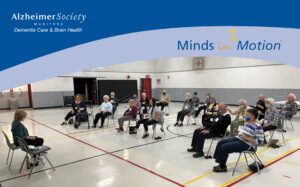
Register today for our Minds in Motion program, designed for people with early to moderate signs of dementia to attend with a family member or friend. This weekly program offered both virtually and across the province includes a gentle chair fitness class followed by engaging activities and conversation.
Check out the available sessions below and register today!
Virtual (Province-wide)
ZOOM Webinar
Thursdays, 10 – 11:30 am
Oct. 13 – Nov. 17 (6 weeks – $45/pair)
Register Here!
Winnipeg Locations
Dakota Community Centre – 1188 Dakota St.
Tuesdays, 1:30 – 3:30 pm
Oct. 11 – Nov. 29
Call to register: 204-254-1010
Rady JCC Fitness Centre – 123 Doncaster St.
Wednesdays, 10 am – 12 pm
Oct. 12 – Nov. 30
Call to register: 204-477-7510
Riverwood Square – 1778 Pembina Hwy.
Tuesdays, 10 am – 12 pm
Oct. 11 – Nov. 29
Call to register: 204-275-7632
St. James Assiniboia 55+ Centre – 3rd Floor – 203 Duffield St.
Tuesdays, 1:30 – 3:30 pm
Oct. 11 – Nov. 29
Full Program – $90/members, $120/non-members
Drop In – $10/members, $13/non-members
Call to register: 204-987-8850
Register Online!
St. James Assiniboine Centennial Pool and Fitness Centre – 644 Parkdale St.
Fridays, 1 – 3 pm
Oct. 14 – Dec. 9 (No Class Nov. 11)
Call to register: 311
The Wellness Institute – 1075 Leila Ave.
Wednesdays, 1:30 – 3:30 pm
Oct. 12 – Nov. 30
Call to register: 204-632-3900
Regional Locations
BRANDON
Seniors for Seniors – 311 Park Ave. East
Thursdays, 1:30 – 3:30 pm
Oct. 13 – Dec. 1
Call to register: 1-204-571-2050
SELKIRK
Gordon Howard Centre – 384 Eveline Street
Wednesdays, 1 – 3 pm
Sept. 28 – Nov. 16
Call to register: 1-204-785-2092
STEINBACH
Pat Porter Active Living Centre – 10 Chrysler Gate
Thursdays, 10 am – 12 pm
Oct. 13 – Dec. 1
Call to register: 1-204-320-4600
RETURN TO TOP OF PAGE
Remember. You Are Not Alone.
We are here to help you and your family no matter where you are in your dementia journey. You can reach a comforting ear by phone or get a quick response by email. Call us at 204-943-6622 (Winnipeg), 1-800-378-6699 (toll free in Manitoba) or email [email protected]
